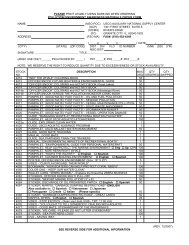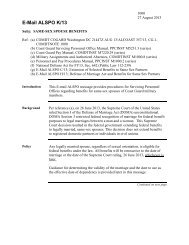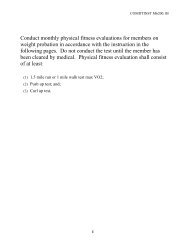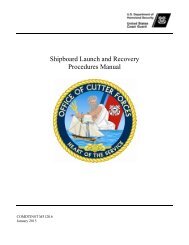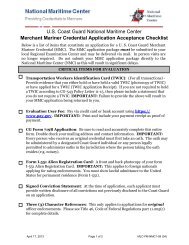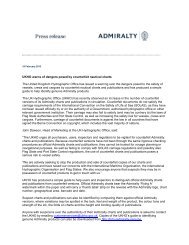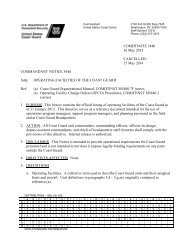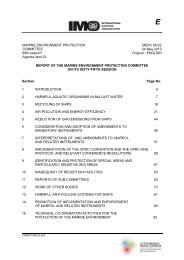Immunotherapy Safety for the Primary Care ... - U.S. Coast Guard
Immunotherapy Safety for the Primary Care ... - U.S. Coast Guard
Immunotherapy Safety for the Primary Care ... - U.S. Coast Guard
You also want an ePaper? Increase the reach of your titles
YUMPU automatically turns print PDFs into web optimized ePapers that Google loves.
skin testing typically is per<strong>for</strong>med by scratching<br />
diluted allergen into <strong>the</strong> skin surface or<br />
by injecting it intradermally. A positive skin<br />
test reaction reflects <strong>the</strong> presence of specific<br />
IgE antibodies to <strong>the</strong> tested allergen, and a<br />
correlation of <strong>the</strong> specific IgE<br />
antibodies with <strong>the</strong> patient’s<br />
Type 1 immediate-hypersensitivity<br />
skin testing with<br />
symptoms, suspected triggers,<br />
and allergen exposure is definitive.<br />
In vitro, allergen-specific<br />
clinical correlation is used<br />
to diagnose a specific IgEmediated<br />
allergy.<br />
immunoassays to detect serum<br />
IgE antibodies are less sensitive<br />
than skin testing but may be<br />
used in patients with skin diseases that would<br />
obscure skin testing results or in those who<br />
cannot stop taking medications that suppress<br />
<strong>the</strong> skin test response. The circumstances in<br />
which allergen immuno<strong>the</strong>rapy is particularly<br />
useful are summarized in Table 1. The<br />
allergens <strong>for</strong> which immuno<strong>the</strong>rapy is known<br />
to be effective are Hymenoptera venom, 5 pollens,<br />
5,6 cat dander, 7 dust mites, 8 cockroaches, 9<br />
and fungi. 10 Allergy immuno<strong>the</strong>rapy is not<br />
efficacious <strong>for</strong> atopic dermatitis, urticaria,<br />
or headaches, and cannot be used <strong>for</strong> food<br />
allergies because <strong>the</strong> risk of anaphylaxis is<br />
too great.<br />
The Authors<br />
Benefits<br />
Durham and colleagues 11 conducted a randomized,<br />
double-blind, placebo-controlled<br />
trial to look at effects in patients who had<br />
JENNIFER L. HUGGINS, M.D., is a fellow in allergy/immunology and rheumatology<br />
at <strong>the</strong> University of Rochester School of Medicine and Dentistry, Rochester,<br />
N.Y. She received her medical degree from <strong>the</strong> University of Kansas School<br />
of Medicine, Kansas City, Kan. Dr. Huggins completed postdoctoral training<br />
in pediatrics at Baylor University in Houston, and in internal medicine at <strong>the</strong><br />
University of Rochester School of Medicine and Dentistry. She is board-certified<br />
in internal medicine and pediatrics.<br />
R. JOHN LOONEY, M.D., is associate professor of medicine and director of <strong>the</strong><br />
Allergy and Immunology training program at <strong>the</strong> University of Rochester School<br />
of Medicine and Dentistry, where he also received his medical degree and<br />
completed postdoctoral training in internal medicine, infectious diseases, and<br />
immunology. He is board certified in infectious diseases, allergy and immunology,<br />
and rheumatology.<br />
Address correspondence to Jennifer L. Huggins, M.D., University of Rochester,<br />
Allergy/Immunology/Rheumatology Fellow, 601 Elmwood Ave., Box #695,<br />
Rochester, NY 14642 (e-mail: Jennifer_Huggins@urmc.rochester.edu) Reprints<br />
are not available from <strong>the</strong> authors.<br />
TABLE 1<br />
Best Indications <strong>for</strong> <strong>Immuno<strong>the</strong>rapy</strong><br />
Allergic rhinitis, conjunctivitis, or allergic<br />
asthma<br />
History of a systemic reaction to Hymenoptera<br />
and specific IgE antibodies to Hymenoptera<br />
venom<br />
Patient wishes to avoid <strong>the</strong> long-term use or<br />
potential adverse effects of medications<br />
Symptoms are not adequately controlled by<br />
avoidance measures or medications<br />
Cost of immuno<strong>the</strong>rapy will be less than cost<br />
of long-term medications<br />
received three to four years of immuno<strong>the</strong>rapy.<br />
They were able to demonstrate a<br />
marked reduction in allergy symptom scores<br />
and antiallergic medication usage, as well<br />
as an alteration in <strong>the</strong> natural course of<br />
allergic disease. Preliminary reports suggest<br />
that immuno<strong>the</strong>rapy <strong>for</strong> allergic rhinitis<br />
may reduce <strong>the</strong> risk <strong>for</strong> later development<br />
of asthma in children. 12,13 In addition, early<br />
treatment with allergen immuno<strong>the</strong>rapy in<br />
children who were sensitive only to house<br />
dust mites reduced development of sensitivity<br />
to o<strong>the</strong>r allergens. 14 In contrast to<br />
<strong>the</strong> use of antiallergic medication, allergen<br />
immuno<strong>the</strong>rapy has <strong>the</strong> potential to alter<br />
<strong>the</strong> natural course of allergic disease and<br />
prevent progression or development of multiple<br />
allergies. Consequently, many allergists<br />
have suggested its use earlier in <strong>the</strong> course of<br />
allergic disease.<br />
In 2000, <strong>the</strong> <strong>Immuno<strong>the</strong>rapy</strong> Committee<br />
of <strong>the</strong> American Academy of Allergy,<br />
Asthma, and Immunology (AAAAI) provided<br />
a five-year cost comparison of medication<br />
usage and single-injection allergen<br />
immuno<strong>the</strong>rapy <strong>for</strong> allergic rhinitis. The<br />
cost of medications is much greater than that<br />
of single-injection immuno<strong>the</strong>rapy. Longterm<br />
costs deriving from <strong>the</strong> morbidity and<br />
complications of allergic diseases are not<br />
established, but allergies usually begin early<br />
in life and persist if not treated with allergen<br />
immuno<strong>the</strong>rapy. A reasonable assumption is<br />
that allergen immuno<strong>the</strong>rapy dramatically<br />
lowers <strong>the</strong> cost of treating allergic diseases.<br />
690 American Family Physician www.aafp.org/afp Volume 70, Number 4 August 15, 2004




